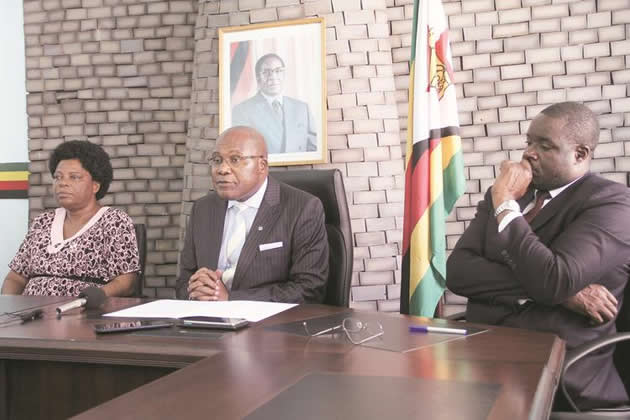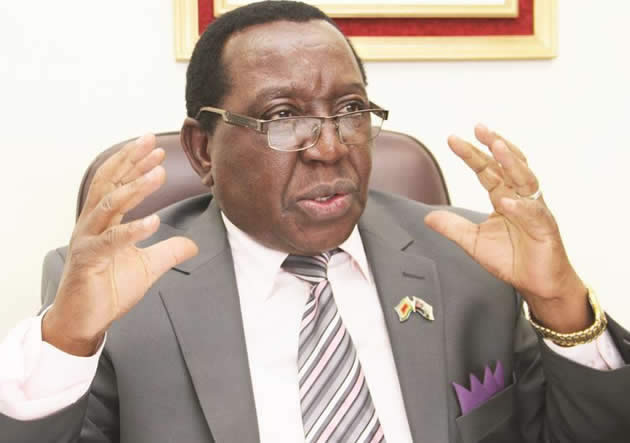Make your marker the national interest


Information, Media and Broadcasting Services Minister Dr Christopher Mushohwe flanked by his deputy Thokozile Mathuthu (left) and Secretary Mr George Charamba during a Press conference in Harare yesterday
Dr Christopher Mushohwe Information Minister
SINCE my appointment to this new portfolio, I have been going through a learning curve to come to grips with the opportunities and challenges facing the information and media sector in Zimbabwe.
To this end, I benefited from briefs on the state of affairs in this sector from my Ministry and from the State enterprises under my ministry.
In addition, I held several meetings with media proprietors, their chief executives and their editors right across the media divide. Very soon, I shall be visiting all the media houses to meet with the generality of editorial teams and general hands in order to appreciate the challenges peculiar to each publishing house and the media environment in general.
I am happy to share with you some of the issues that have come up in the course of the consultations and interactions I have had with the media and also raise with you our concerns as Government regarding the state of our media. The sector, particularly, the newspaper industry, has been affected by the current harsh economic climate prevailing in the country as a result of the imposition of illegal economic sanctions by the Western countries against Zimbabwe.
Many media houses have been forced to restructure and downsize in order to stay in business, resulting in the laying off of many journalists.
As is the case with other industries, many newspaper publishing houses are experiencing high production costs arising from old and obsolete equipment, high newsprint and declining readership.
The newspaper industry is facing stiff competition from the new media as the young generation prefers the new media to newspapers for their daily news consumption. However, viability challenges coupled with the declining readership are not caused by lack of capital or the advent of new technologies alone, but may be caused by other factors such as poor business strategy, failure to exploit economies of scale, peddling a poor product and the media being self- destructive.
Our media should bear in mind that the negative stories they publish about the country, about Government, about the ruling party and its leadership have a bearing on how foreign investors perceive the investment climate in our country. Once investors lose confidence in a country, you begin to witness disinvestment, capital flight, company closures, unemployment and this has a bearing on business prospects.
Editorial content plays a critical role in the newspaper industry, especially where the market is small as in our case.
There are many players seeking to share a small cake. The advertising industry is shrinking as a result of the economic challenges many companies are facing.
The middle income group has been hit hard in the pocket and yet this is the class that buys newspapers the most. Government on the other hand is a very big newspaper client. In my interaction with the media proprietors, having listened to some of the challenges they were highlighting to me, I also put it to them that they had themselves to blame for failing to protect their own business interests and their own investments.
I asked them, who needs a bad Press, who invests in a bad Press? A bad Press, is simply bad, it is not good for the country, it is not good for Government, and it is bad business. In the three months that I have been in charge of the media sector, I have been struck by the occurrences and intensity of bad Press targeting in many instances His Excellency the President, the First Lady and the two Vice Presidents.
Every day, there is a negative story about one, both or all of them. Every day! What kind of journalism is that, I asked many of my interlocutors?
I recalled for many of the media proprietors the following adage; “He, who owns the piper, calls the tune”. It is high time media proprietors fulfilled their promise to rein in errant editors and reporters.
An adversarial relationship between Government and the media can never translate into a thriving publishing industry or a country which is positively projected and perceived.
At independence we inherited a media which had been used by the Rhodesians to demonise the liberation struggle, to denounce our political leaders and to demonise the whole liberation ethos.
We fought for democracy, human rights, peace, national independence and sovereignty. When we took back our land, our erstwhile colonisers were offended and they resolved to fight against the ruling party Zanu-PF and to effect regime change.
We saw the emergence in the private media or independent media a tendency to routinely counter the public media and attack institutions of the State. And we are saying to the private media, Government is not the enemy. President Mugabe is not the enemy, the First Lady and Family are not the enemy, the Vice Presidents are not the enemies.
You have the national interest to defend.
The national interest includes, among other concerns, the sanctity of our independence and national sovereignty; our right to self-determination; national unity and the indivisibility of Zimbabwe; national security; sensitivity to our economic interests; our right to our national resources; national culture; justice; and empowerment, and of course democracy.
It also refers to the primacy of our Constitution and those values which it upholds.
Government and indeed my Ministry are willing to work with the private media which are truly original in thinking and national outlook, not proxies of the West or some NGO. We want to see a professional media in Zimbabwe, a pluralistic media expressing divergent viewpoints, yes, but converging on defending the national interest. We have witnessed media polarisation for the past 14 years fuelled, of course, by our erstwhile colonisers who started creating new media projects under the pretext of democracy in Zimbabwe, claiming that there was no democracy in the country, no human rights, no rule of law and that there was bad governance.
We have experienced how counter-productive media polarisation is to a country.
National development is undermined by divided media fighting against each other, while ignoring bread and butter issues, focusing on politics of the country at the expense of the economy of the country. I am committed to de-polarising the media which in my view should be defined not on the basis of ownership, but on the basis of professionalism.
I was, however, caught flat–footed by some media proprietors who, when l challenged them about the negative stories that come up often in their publications, told me that most of those stories were being planted by some of our own leaders pursuing personal agendas.
We say shame to such leaders because they are not different from those using the media as a tool for regime change. Government is on their case as these leaders are undermining cohesion in the party, Government and could end up dividing the country.
As we open a new year which is virtually upon us, we have very definitive expectations in respect of the media industry.
We expect a high sense of professionalism and sensitivity to matters of national interest. I committed myself to working with proprietors to ensure good practices in the media.
However, in the event that the hand of goodwill extended by the Government is not reciprocated in equal measure, then Government will take corrective measures in terms of the law.
In January, the whole industry shall be consulted in the context of a retreat at which a new media policy will be debated and framed. I count on your cooperation.
- This is the Ministerial Statement by Honourable Minister of Information, Media and Broadcasting Services Dr Christopher Mushohwe, Munhumutapa Boardroom, December 9, 02015.








Comments